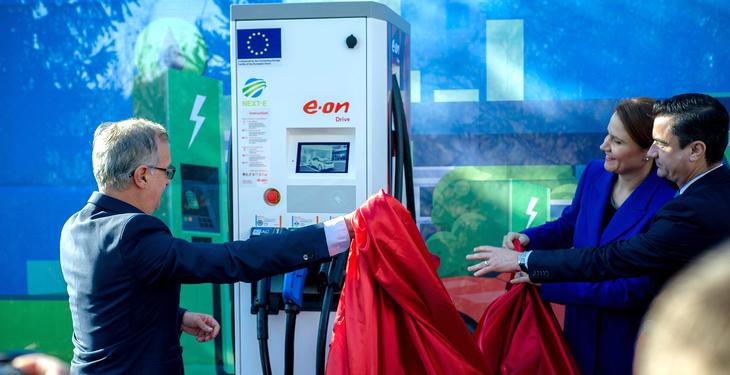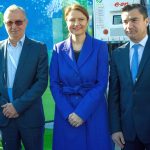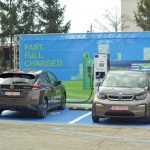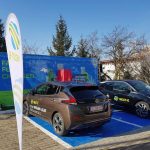E.ON Energie Romania put into operation in a MOL gas station in Iasi the fifth fast-charging station for electric vehicles from the 19 units it aims to install in Romania under the NEXT-E project. The project is supported by European funds through the Connecting Europe Facility (CEF).
Located in the perimeter of the MOL gas station in Păcurari, the station has a maximum power of 93 kW. Thus, the average charging time of an electric car will be about 40 minutes for 80% of the battery.
- Dan Morari, Director General E.ON Energie România; Camelia Ene, CEO MOL România; Mihai Chirică, primarul Municipiului Iaşi
Two charging stations in the villages of Târgu Frumos and Cristeşti have already been put into operation in Iaşi County; they add to those already opened in Tăşca (Neamţ County) and Adjud (Vrancea County). At the same time, the completion and commissioning of other stations in Piatra Neamt and Roman (Neamt County) and in Scheia (Suceava County) are planned for March. Each station will have a fast charge station of 2×50 kW (DC) + 1×43 kW (AC). Each station will also have at least 2 parking spaces.
By the end of next year, E.ON plans to implement the project on the route Iasi-Gheorghieni-Tg. Mureş, which will thus become an “electric highway”, writes a press release, so that all owners of environmentally friendly cars to benefit from, having the charging infrastructure needed on the entire route. Another “electric highway”, which will link Iasi to Bucharest, is in full swing.
“Statistics showing a significant year-on-year increase in the number of electric vehicles sold in Romania are extremely gratifying, as it indicates a clear orientation towards one of the most environmentally friendly and sustainable modes of transport, just as it happened around the world. In this context, the serious question is whether the charging infrastructure will be able to keep up with this trend. We believe it is essential to meet the wishes and needs of e-cars owners, by giving them easy access to the charging stations. In fact, we want to be with them on all their electric trips so that they have the most enjoyable experience”, said Dan Morari, general manager of E.ON Energie România.
“We are glad to witness today, at the MOL station in Pacurari (Iasi), the opening of one of the 40 charging stations for electric vehicles that will be installed under the NEXT-E project. The MOL Group adopted the Strategy 2030 three years ago, a vision that sets the company’s main directions for the next period. One of the foundations behind the development of this strategy was MOL’s desire to become the first choice for its customers. We are aware that we are experiencing a time of major change, which will be reflected strongly in our clients’ consumption habits, but we are ready to anticipate their needs and provide them with the best solutions”, said Camelia Ene, CEO & Country Chairman MOL Romania.
All 40 NEXT-E stations (of which 19 will be installed by E.ON and 21 by MOL Romania) will be located on the following routes: Suceava-Bacau-Calarasi, Constanta-Bucharest-Timisoara and Iasi-Tirgu Mures-Alba Iulia. With this initiative, the charging station infrastructure for electric vehicles for the European strategic road corridors (TEN-T) will be completed with the infrastructure of charging stations for e-vehicles in Romania, facilitating low-CO2 transport by road and reduced environmental impact.
Stations will be integrated into a system for monitoring and managing the charging sessions. This system provides 24-hour supervision of the unit and has the ability to remotely resolve any incidents occurring during charging. Additionally, any problems encountered at the charging stations can be notified 24/7 by telephone at a E.ON call center.
In July 2017, the NEXT-E project was selected by the European Commission for co-financing through the Connecting Europe Facility (CEF). The NEXT-E consortium will receive EUR 18.84 million to implement the project, this being the largest ECF funding for a project on electric vehicles. Within this program, by 2020, 222 multi-standard (50 kW) fast charging stations and 30 ultra-fast (150-350 kW) charging stations will be installed along the main corridors European transport network and the trans-European transport network (TEN-T). As an absolute premiere, long distance travel, 100% based on electricity, will be possible in six Member States with links to neighboring countries.
The Consortium consists of companies from the E.ON Group (Zapadoslovenská energetika in Slovakia, E.ON Czech Republic, E.ON Hungary, E.ON Romania), MOL Group (subsidiaries from the six participating countries), Hrvatska elektroprivreda from Croatia, PETROL (in Slovenia and Croatia) as well as Nissan and BMW.



